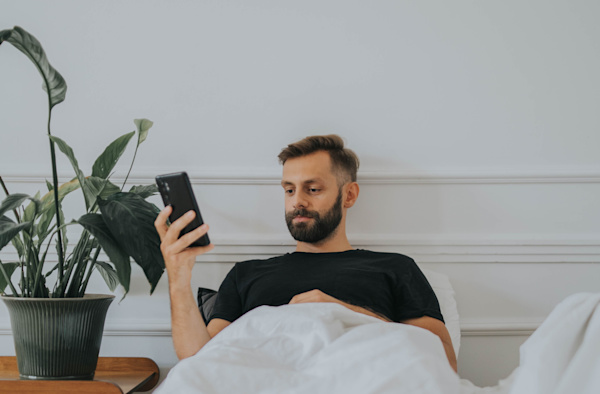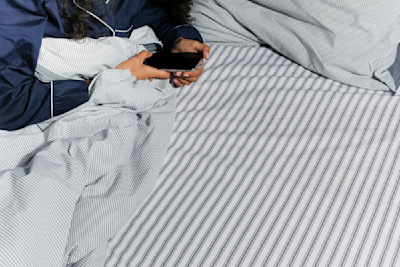
What happens when you use your phone in bed?
Blue Light & Sleep
Have you ever tucked into bed, only to find yourself scrolling endlessly through your phone?
Maybe you're catching up on messages, diving into social media, or reading the news.
While it may feel like a harmless way to unwind, using your phone in bed is anything but. It’s not only a bad habit, it can also sabotage your sleep, strain your relationships, and negatively impact your overall well-being.
Yet, for many of us, it feels non-negotiable because we rely on our smartphones as alarms.
Here’s the truth: starting and ending your day with a digital device is not doing you any favors.
Let’s explore the reasons why, and how you can break free from this cycle.
7 Reasons Why Using Your Phone in Bed Is Hurting You
1. Blue Light Disrupts Your Sleep
Your phone’s screen emits blue light, which suppresses melatonin, the hormone responsible for regulating your sleep.
This tricks your brain into thinking it’s still daytime, delaying sleep onset and disrupting your natural circadian rhythm.
Even brief exposure can make it harder to wind down. So, even though your body may be tired and ready for bed, when your eyes are exposed to blue light, you will find it harder to drift off to peaceful sleep.
2. Your Brain Stays Overstimulated
We all know smartphones are designed to keep you engaged. Whether it’s the latest viral video or a barrage of notifications, your brain stays in overdrive.
This cognitive stimulation makes it harder to relax, and engaging with stressful content can elevate cortisol levels, further hindering sleep. To put it simply, your smartphone is a distraction that keeps you from winding down and preparing for sleep.
3. Bedtime Procrastination Becomes a Habit
‘Revenge bedtime procrastination’ is a growing phenomenon where people sacrifice sleep to reclaim ‘me time.’ We’ve written about this concept in another article on our blog.
Basically it’s the idea that people stay up late to do things they enjoy, like watching TV or scrolling through social media. This can lead to a vicious cycle where you’re tired during the day and then have trouble falling asleep at night because your phone’s endless content keeps you up later than intended, reducing both the quantity and quality of your sleep because phone’s endless content keeps you up later than intended, reducing both the quantity and quality of your sleep.
4. Your Circadian Rhythm Gets Out of Sync
Your internal clock relies on consistent light-dark cycles to regulate sleep. Smartphones disrupt this rhythm, leading to fragmented sleep, daytime grogginess, and reduced alertness.
To read about how to reset your circadian rhythm, check out the article on our blog: READ: How to Reset Your Circadian Rhythm
5. You Risk Physical Discomfort
Using your phone in bed often means poor posture. Holding your device at awkward angles can cause neck and back pain, while prolonged screen time leads to digital eye strain. Both of these can interfere with your ability to relax.
When your neck aches or your eyes hurt, it’s hard to drift off to peaceful slumber easily.
6. You Condition Yourself to Stay Awake
Your bed should be a sanctuary for rest, devoted to sleep and relaxation. However, when you use digital devices in bed, like scroll on your phone, watch TV, or answer emails on your laptop, your brain starts associating it with activity instead of sleep.
Over time, this can lead to insomnia or difficulty falling asleep because you've conditioned yourself to stay awake when you’re in bed.
7. Your Intimacy May Suffer
Sharing a bed with someone? Using your phone instead of engaging with your partner can create emotional distance and reduce intimacy.
A glowing screen acts as a literal and figurative barrier between you and meaningful connection at the end of the day.
How to Break the Habit
Breaking the cycle of phone use in bed is challenging, however it’s entirely doable.
Here’s a step-by-step plan to help you reclaim your evenings and mornings:
1. Replace Your Smartphone Alarm
The reliance on your smartphone as an alarm often keeps it on your bedside table, within arm’s reach. This makes it very hard to disconnect.
Switching to a mindful alarm clock, like the Mudita Bell 2, or Mudita Harmony 2 eliminates the need for a phone in the bedroom.
The minimalist design of Mudita alarm clocks ensures a peaceful wake-up without the distractions of a screen.
For those who prefer additional features, the Mudita Harmony 2 offers an E Ink display, soothing alarm tones, and even a Meditation Timer to help you transition from work to relaxation. These devices create a healthier boundary between you and your phone.
Mudita Harmony 2 Relaxation Library
2. Set a Phone Curfew
Commit to putting your phone away at least 60min before bedtime. If you can manage a 90-minute or a 2-hours digital detox, that’s even better. One simple trick is to charge it outside the bedroom to remove temptation.
3. Create an Offline Bedtime Routine
Replace your phone with calming activities. Read a book, meditate, or journal. Mudita Harmony 2’s pre-loaded relaxation audio and soft ambient sounds can help create a soothing bedtime ritual.
4. Use Blue Light Filters
If avoiding screens isn’t feasible, because you have to pull an all-nighter, enable night mode or a blue light filter on your devices to reduce the impact on your melatonin levels.
5. Set Boundaries with Notifications
Turn off non-essential notifications in the evening to reduce the urge to check your phone. Use "Do Not Disturb" settings to maintain a distraction-free zone.
6. Focus on Connection
Instead of scrolling, use bedtime as an opportunity to reconnect with your partner or reflect on your day. Sharing even five minutes of conversation or gratitude can foster deeper intimacy and improve emotional well-being.
Check out our article on this topic & discover that true connection begins where distractions end.
READ: Unplug to Connect: A Bedroom Rule To Strengthen Your Relationship
The Bottom Line
Your phone might feel indispensable, especially as an alarm or a way to wind down, but its presence in bed is more harmful than helpful.
From disrupted sleep cycles to strained relationships, the negative impacts are undeniable.
By making simple changes, like switching to a Mudita alarm clock and setting phone-free boundaries, you can reclaim your nights, improve your sleep, and foster better connections both with yourself and others.
Mudita Harmony 2 & Mudita Bell 2
Isn’t it time to put your phone to bed, before it puts your well-being on snooze?
For more sleep tips and to explore our range of products, visit Mudita’s Sleep Better page and take the first step towards a healthier sleep routine.
You can also check out these additional articles for more information on sleep, health and overall well-being:
Read also:
Here’s to better nights and brighter days!
Related stories

The Digital Detox Guide for Better Sleep
Struggling with poor sleep? Discover how a digital detox can improve sleep quality, support better sleep hygiene, and help you sleep better naturally.

What Happens When You Sleep?
Discover what happens when you sleep, from brain detox to hormone regulation. Learn how to enhance sleep quality naturally and wake up refreshed.

Why a Mudita Alarm Clock is The Most Sought-After Gift Of 2024?
Give the gift of better mornings! Discover why a mindful alarm clock is the perfect holiday present - practical, stylish, and designed for healthier sleep.
If you'd like to receive the best stories from our blog, keep up to date with our progress and get notified about our product releases and special discounts.